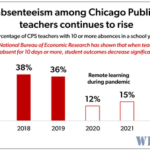

In 2023, three states — North Carolina, North Dakota, and South Dakota — expanded their Medicaid programs, bringing the total number to do so to 41. As 2024 nears, pressure will be on the remaining holdout states to follow suit. But whether the expansion has improved the health of the poor remains an open question.
Medicaid is the state and federal program designed to provide coverage for those in poverty. Enactment of the Affordable Care Act in 2010 required states to expand their Medicaid programs to cover up to 138% of the federal poverty level ($41,400 for a family of four in 2023). The Supreme Court later ruled the federal government could not force states to expand the program but that states could opt in. Half of the states declined to expand Medicaid in 2014, the first year of expansion. Over time, that number has been whittled down to nine.
SPEAKERLESS HOUSE: THE LONGEST THE HOUSE HAS GONE WITHOUT A SPEAKER
Efforts continue even in states where expansion is a long shot.
In early 2023, the Revenue Committee in the Wyoming House of Representatives approved a bill to expand Medicaid by a vote of 6-3. But the bill died after Republican House Majority Leader Chip Neiman did not schedule it for a hearing on the House floor.
It was the ninth failure of Medicaid expansion in the Cowboy State.
The closest it has ever come was when expansion supporters in the state Senate tried to attach it as a budget amendment in 2016. That attempt failed by a vote of 20-10.
“It fails because there are always more than enough conservative legislators who oppose it,” said Josh Hannes, vice president of the Wyoming Hospital Association.
Hannes said WYA won’t request a Medicaid expansion bill in 2024 because Wyoming’s legislature will be focused on the state budget, making it harder for other issues to get a hearing.
“Nevertheless, I expect that someone will introduce an expansion bill,” Hannes said. “And we will support it.”
States that do not expand Medicaid leave open a “coverage gap.” People in that gap are ones who make too much money to qualify for Medicaid but not enough money to qualify for tax subsidies to help purchase private coverage on the Obamacare exchanges.
New research from the liberal Commonwealth Fund suggests that expanding Medicaid increases access to care for people who would otherwise fall in that gap.
“It’s not very surprising that when you give people health insurance, they have better access to healthcare,” said Sharon Glied, co-author of the research and dean of the Robert F. Wagner Graduate School of Public Service at New York University. “What we see is that compared to people who would have been in the coverage gap, they were more likely to have a checkup, less likely to avoid going to the doctor because of cost, and so on.”
Not only did the research find that people with Medicaid were more likely to see a doctor, but they were also more likely to seek preventive care, such as a mammogram.
However, getting access to coverage does not necessarily improve health outcomes.
“It’s not just enough to hard to say you have coverage and we’ve reduced the number of uninsured,” said Nino Owcherenko Schaefer, director of the Center for Health and Welfare Policy at the Heritage Foundation. “Treating the Medicaid population is much more complicated than that. Are you actually at the state level providing the care that is needed to the population you are trying to serve before expanding Medicaid?”
One problem Owcherenko Schaefer points to is that many physicians either refuse to see Medicaid patients or refuse to take on new Medicaid patients. A 2019 survey by the Medicaid and Children’s Health Insurance Program Payment and Access Commission found that primary care doctors in expansion states were no more likely to see Medicaid patients than they were before the expansion.
In 2013 the New England Journal of Medicine published the results of a Medicaid experiment in Oregon. In 2008 Oregon permitted a limited expansion of its Medicaid program. Over 90,000 people applied, and 30,000 people were admitted via a lottery. Researchers were able to study those who were admitted to the Medicaid program via the lottery with those who were not.
The study found Medicaid coverage only improved mental health outcomes among beneficiaries. There were no other health benefits. Coverage did not improve outcomes for common health problems like diabetes or high blood pressure.
Nevertheless, Glied argues that states should expand Medicaid, pointing out that Medicaid can provide protection from high medical bills.
“It’s better for the people in their states to expand Medicaid. They will have access to services. They won’t go bankrupt,” she said.
CLICK HERE TO READ MORE FROM THE WASHINGTON EXAMINER
Owcherenko Schaefer, though, warns that expanding Medicaid can crowd out spending on other healthcare priorities.
“Recent research has documented that in expansion states, the additional Medicaid spending is squeezing out spending on the traditional Medicaid population, especially among children,” she said.





